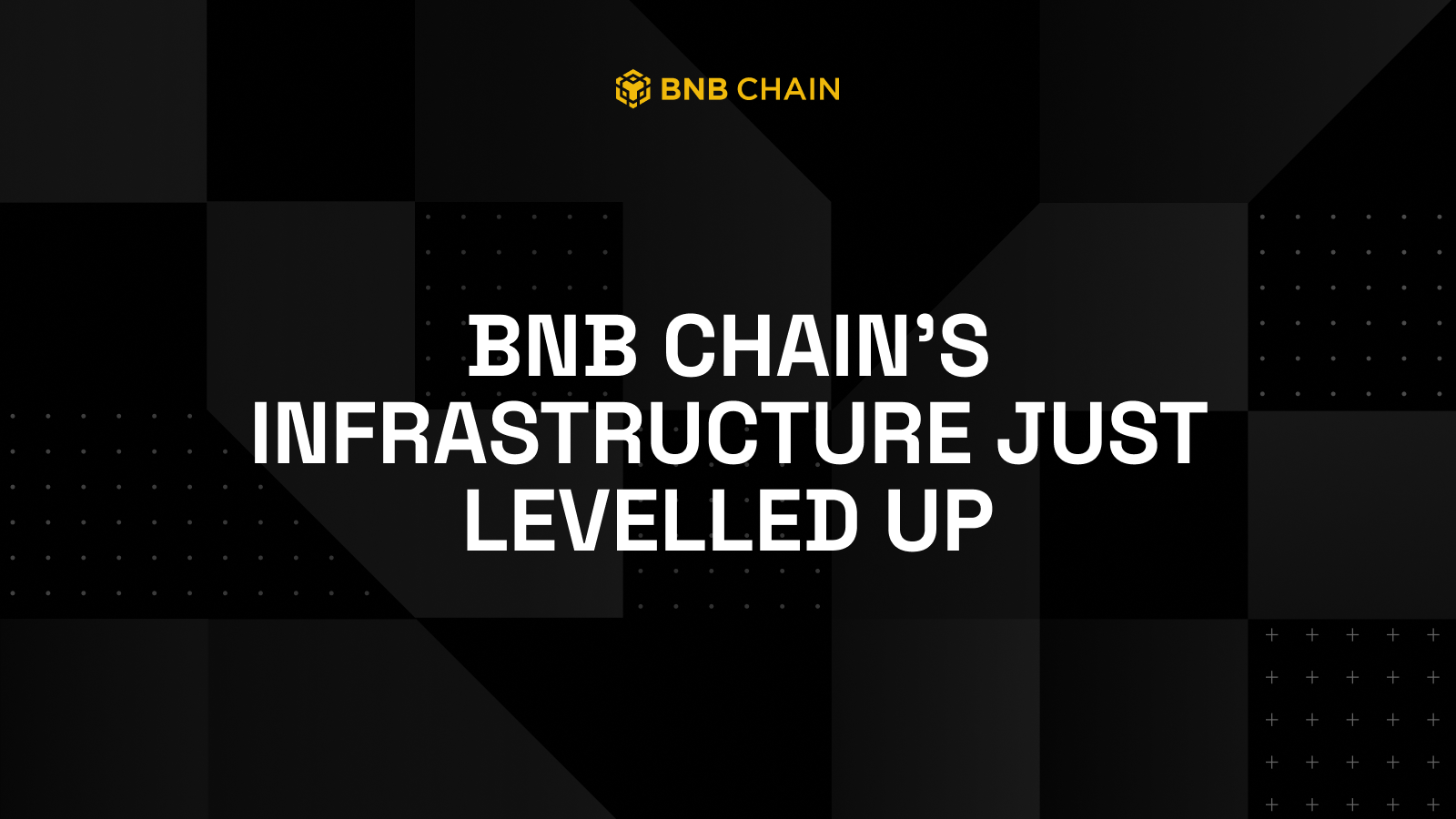Chains
BNB Beacon Chain
BNB ecosystem’s staking & governance layer
Staking
Earn rewards by securing the network
Build
Explore
Accelerate
Connect
Careers🔥
Explore Opportunities on BNB Chain
BNB Chain’s Infrastructure Just Levelled Up, Here’s What Changed

TL;DR
- BNB Chain now processes 100M gas per second with 750ms block times, improving speed and reducing fees.
- Recent upgrades optimized block production, validator sync, and network coordination for high-performance execution.
- MEV sandwich attacks dropped by over 95% thanks to shorter blocks and Good Will Alliance coordination.
- With $165B in recent DeFi volume, BNB Chain is scaling for real usage and planning for long-term targets like 1 gigagas/second.
A New Performance Benchmark for BNB Chain
BNB Chain has officially reached 100 million gas per second throughput and a 750ms block time, a milestone made possible through the Lorentz and Maxwell hardforks.
This upgrade doesn’t just improve speed, it reshapes the user experience and developer potential across DeFi, gaming, and emerging Web3 use cases.
Before these upgrades, BNB Smart Chain (BSC) operated with a 3-second block time and 47 million gas per second throughput. Now, with a block gas limit of 75 million processed every 750 milliseconds, throughput has increased to:
(75,000,000 gas / 0.75 seconds) = 100M gas/second
Thanks to Fast Finality on BSC, confirmation times are now under 2 seconds, resulting in lower latency, reduced fees, and improved user experience.
This also substantially mitigates MEV risk by narrowing the window for manipulation.
What this means:
- Users get faster transaction confirmation (under 2s), lower latency, and cheaper fees
- Builders can develop apps that rely on higher throughput, like on-chain order books or games
- Validators and infra partners now coordinate across a faster-moving, more secure base layer
This performance milestone is a direct result of BNB Chain’s roadmap to scale with real usage—not hype. It's a chain designed to evolve as demand grows.
Scaling for DeFi: 165 Billion in Swaps and Rising
BNB Chain's performance upgrades come in response to surging onchain activity. Over the past 6 months:
- More than $165 billion in swap transactions were processed
- Daily active addresses returned to peak levels
- BNB Chain ranked among the top in swap transaction volume (source)
These numbers reflect DeFi’s evolution toward more performance-intensive applications, such as Automated Market Makers (AMMs) & Central Limit Order Books (CLOBs). In June 2025, Hyperliquid’s perpetual contract trading volume hit $9.3B in daily volume for perpetuals—65% of the on-chain derivatives market. That’s the level of throughput modern dApps require.
BNB Chain met the recent surge in load without blinking. During a 24-minute window on June 20, 2025, under intense traffic:
- Blocks were 98% full
- Peak throughput hit 1,467M gas/second
- Average throughput stayed at 892M gas/second
Source: BscScan
No downtime. No bottlenecks.
This level of resilience is the result of deep technical upgrades made under the Lorentz and Maxwell hardforks. Key architectural improvements included:
- Path-Based Storage System (PBSS): Optimized how transaction data is stored and propagated across the network, reducing block propagation time and increasing throughput.
- Consecutive Block Production: Enabled validators to produce back-to-back blocks more efficiently, minimizing idle time and increasing transaction capacity.
- Validator synchronization and consensus upgrades: Improved the speed and consistency of validator communication, allowing faster finality even under pressure.
- Ecosystem-wide coordination: From builders and validators to RPC endpoints and explorers, every part of the infra stack was optimized to support low-latency, high-volume throughput.
The outcome is a DeFi-ready chain that can handle billions in volume while maintaining speed, stability, and security. And more importantly, it shows that the BNB Chain is already built for future demand and growth.
Real-Time MEV Mitigation: Security Built into Speed
Faster blocks also mean better security—especially against MEV (Miner Extractable Value) attacks like sandwiching.
With only 750ms between blocks, there’s far less time for bots to exploit pending transactions. This upgrade, combined with the Good Will Alliance (GWA), slashed sandwich attacks by over 95%.
GWA builders now construct over 90% of blocks, thanks to upgraded algorithms and real-time coordination.
This is a powerful demonstration that performance and security can scale together—if the infrastructure is built right.
Road to 1 Gigagas/Second
The 100M gas/s milestone is just the beginning. BNB Chain’s next major objective is to scale to 1 gigagas per second. This results in a 10x increase in throughput designed to support the next generation of real-time blockchain applications.
This is a targeted direction for the second half of 2025 and beyond. Achieving it will require deep architectural changes across the protocol stack: raising the block gas limit, improving execution efficiency, and redesigning validator coordination to support real-time responsiveness.
The long-term vision includes:
- Raising the block gas limit from 100M to 1 Gigagas per second
- Enabling up to 5,000 swaps per second
- Supporting real-time confirmations and complex smart contract execution
- Unlocking use cases in DeFi, restaking, onchain perps, AI agents, and high-frequency trading
These performance ambitions are part of BNB Chain’s broader 2025–2026 outlook, with detailed research and system design expected to evolve in parallel with ecosystem needs.
Conclusion
The Lorentz and Maxwell upgrades have pushed BNB Chain to 750ms block times and 100 million gas per second throughput, improving speed, cost, and security across the board.
These changes directly support the chain’s focus on real-world performance, enabling smoother DeFi activity and a better experience for users and builders.
While 1 gigagas per second remains a long-term goal, BNB Chain’s current focus is on enhancing execution and scaling the network to meet growing demand.
Follow us to stay updated on everything BNB Chain
Website | Twitter | Telegram | Facebook | dApp Store | YouTube | Discord | LinkedIn | Build N' Build Forum